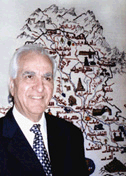Tourism Culture In The School Syllabus
After my last trip to Morocco, my friend, Ahmed Joma’a, education expert in vocational training in Iraq, volunteered to take me to the airport. During the trip we had a short discussion about tourism. We asked why certain countries have experienced a strong surge of tourists and others, richer in sites, heritage and climate more appropriate to tourism, do not have the same attraction? My friend’s answer summarized the reason eloquently: “it is essential for any country aspiring to have a place on the map of international tourism to develop a culture of tourism”. I realized the range and depth of his answer only a little later and that took hold of my spirit and kept me awake at night.
Today, in the 21st century, different subjects are imposed on children from nursery school and accompany them until the last stage of their student life – even their whole life. The culture of any country is measured by the cultural capacitates of its citizens. It is therefore legitimate to raise the following question: why not add the lessons of tourism culture to develop the personality of the citizens. This education should begin in junior school and continue to doctoral level.
Are there countries which have integrated tourism courses into their educational system? Are these courses universally available or restricted to certain institutions or levels? Interested researchers will have to carry out studies on the experiments of different countries in this field.
Why tourism culture?
Why is a culture of tourism essential for the nation, the people and the individual? There are several answers to this question.
• For the nation:
- Tourism contributes to the construction of the infrastructure and the economy of countries, by emphasizing their tourist assets: heritage, cultural, religious and leisure sites. Tourism stimulates the economic, social and regional development of each country, by emphasizing its natural, economic, social and human assets: its infrastructure (roads and various services), its economic and professional sectors (craft industry, agricultural produce and food, trade, transport services etc) and its cultural, religious and artistic heritage. It attracts investors from various branches of tourism and related sectors, as well as the hard currencies which make it possible for the country to pay for its imports.
• For the people:
- Tourism requires the host country to deal with tourists with sincerity and respect and give them a cordial reception. Thus the country can promote a good image and leave a favourable impression on visitors. Tourism also provides the opportunity to gain knowledge about other countries and their cultures, while making it possible to learn from the culture and behaviour of tourists. This requires wisely developed plans to preserve the indigenous culture and prevent any negative spinoffs which do not respect human and ethical values, especially Islamic values.
• For the individual
- The school syllabus is necessary for human culture and so it is vital for the individual. The tourist sector is important for the individual because it is a source of employment. There are career opportunities in the hotel trade, travel agencies, work as guides etc. Through tourism, one learns how to take photographs and write memories or articles in a restful and pleasurable environment. Through tourism young people learn, to shoulder their responsibilities, to manage their own businesses and to solve problems. Their horizon opens to acquaintance with young people from other countries. Thus, tourism makes it possible for individuals to build their cultural identity and to expand their horizons beyond their own city or country. It also enables them to become aware of the importance of languages, which are the genuine keys of tourist culture.
Materials Available For Tourism Syllabus
1 - The issues of Islamic Tourism magazine, (24 sofar), contain hundreds of articles on various countries and destinations throughout the world, written by specialized writers.
2 - The website of Islamic Tourism magazine (www.islamictourism.com) which publishes weekly news bulletins in five languages as well as information about the four continents. It also makes available the contents of all previous issues and past news published on the website.
3 - Encyclopaedias of the heritage, culture and other aspects of various countries.
4 – The artistic, cultural and theatrical productions which are shown on TV to highlight places of interest.
5 - Works of professional writers or amateurs, recalling their impressions of the countries they visited.
6 – Stories for children and films, such as Sinbad, Ali Baba, Ibn Battuta and others.
7 - Places of tourism interest and their heritage.
8 – Museums
9 - Mausoleums, religious sites and occasions of their visits.
10 - Leisure parks and resorts.
11- Religious, cultural and sporting festivities.
12- The principles and decisions of international organizations, especially the World Tourism Organization, a UN body which recently adopted a code of ethics of tourism, outlining values that all participants in the tourism sector must observe.
I will conclude by recalling an incident on the aircraft which transported me from London to Casablanca, then Marrakech. A group of young people, boys and girls, were going to Marrakech on a school trip. I do not know if their trip was cultural or leisure, nor if they were accompanied by teachers. Their loud voices and laughter during most of the trip annoyed all the other passengers.
I intervened, to let them know that they disturbed us adding: “Your school should teach you the values and good behaviour of tourism, before sending you on this voyage.” After that they kept silent and the rest of the flight was peaceful.
This incident convinced me that I should take a greater interest in the culture of tourism and consolidate my idea to set up an Academy of Islamic Tourism. This institution would develop a culture of tourism and promote ethical tourism on a world-wide basis. Islamic Tourism has in fact been promoted in the Koran: “O Mankind! We created you from a male and a female, and made you into nations and tribes, so that you may know each other. Verily, the most honoured of you in the sight of Allah, is the most pious.” (Sourat Al-Hujurat, 13).
We hope that future generations are equipped with a better culture of tourism, as tourism is the key to building bridges of understanding between peoples.
May God guide us to success.
|

